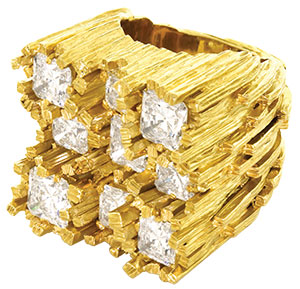
|
Diamond and 18-karat gold Modernist ring,
circa 1960-1970s. Photo courtesy
Lawrence Jeffrey Estate Jewelers. |
The 4Cs are not the only things that make a piece of diamond jewelry a sales winner. In an ongoing series, Rapaport Magazine explores the “3Ws” — what’s selling, what’s not and why — by going straight to the people who really know — jewelry retailers. Each month, we ask a sampling of retailers to comment on the important issues that are facing the industry today. Here is what they had to say when asked:
“Do you have an estate jewelry department? What type of merchandise sells best?”
“We have pieces that go back to the Georgian period and then we have pieces that might only be five or ten years old. Most are from the 1920s and 1930s; antique filigree rings and platinum rings from that period do well. It is a department that we’ve expanded a lot over the past seven years. We see engagement ring customers who are interested in the real thing and not a reproduction because of the quality of the pieces. The rings from that period were predominantly die-struck so they’re strong as steel.
“Typically we price the pieces we consider more current very well so they offer a lot of look for the money. It’s the beauty and uniqueness of the piece, the romance of a piece that has survived for 80 years.”
“We do more in the buying end rather than selling. We do have a small estate section but most everything that I buy I resell very quickly to dealers. I act more as a broker. I buy a piece and/or sell it for a commission for the customer. People are selling everything and anything — jewelry that’s just gold, things from the 1950s, 1960s, and 1970s. We don’t see a lot of the real antique jewelry as opposed to estate jewelry. The antique or period pieces we resell.”
“We do sell estate jewelry. The only thing that really doesn’t sell for us in estate is bridal. In the upper Midwest we don’t get a lot of the really fantastic Art Nouveau or Art Deco pieces. A lot of our stuff is 1960s, 1970s and 1980s — nice colored stone pendants tend to go quickly, especially when I keep the price very reasonable. Diamond goods tend to be pieces from the 1960s through early 1980s, three to five rows of diamonds going in an arch dangling across the finger. Those typically go quite quickly; they’re a lot of look for not too much cash. The estate department is an important part of our business — not huge, but important.”
“We used to have an estate department, but we’ve moved to mostly bridal and so estate hasn’t been our focus. But it is something we’re going to look at coming up. I think the styling of the older engagement rings is wonderful and we do utilize that through a couple of our designers but we aren’t doing anything that is truly old.”
“We do very well with estate. Art Deco is always very popular. We do a lot of Victorian things. More ‘modern’ eras don’t do as well, unless the price is right. Retro is okay. We live in an historic town so it has a lot to do with why they want something that stands out. We have a lot of tourists who come and they get caught up in the old and they want something to remember their trip, whether it’s a locket or Victorian bracelet or something like that. We also sell a lot of antique engagement rings, cushions and Asschers, because the brides today don’t want to see the same ring on everybody’s fingers.”
“We don’t specifically sell estate, but it’s been something that more and more we’ve dabbled in. There’s no one specific period customers are interested in, it’s more about value — something that has longevity and that’s timeless.”
“We do sell estate and it’s become a significant part of our business. And it’s growing. If customers see a necklace they like and it’s a good value, they buy it or a pair of earrings, a bracelet or watch or cameos. We do not discount any of our estate jewelry. We have a studio so what we buy over the counter we can restore rather than melt. Because we can restore items, we are able to pay more for the pieces customers are selling than people who melt it. Customers who come in to buy things are buying the jewelry at an advantageous price and we’re selling it at an advantageous margin.”
“We do sell estate jewelry. Customers either want something unique or they’re looking for a great bargain. We’ve had this department for a while. It’s a sizable department. Interest in the different periods is across the board.”Article from the Rapaport Magazine - June 2016. To subscribe click here.